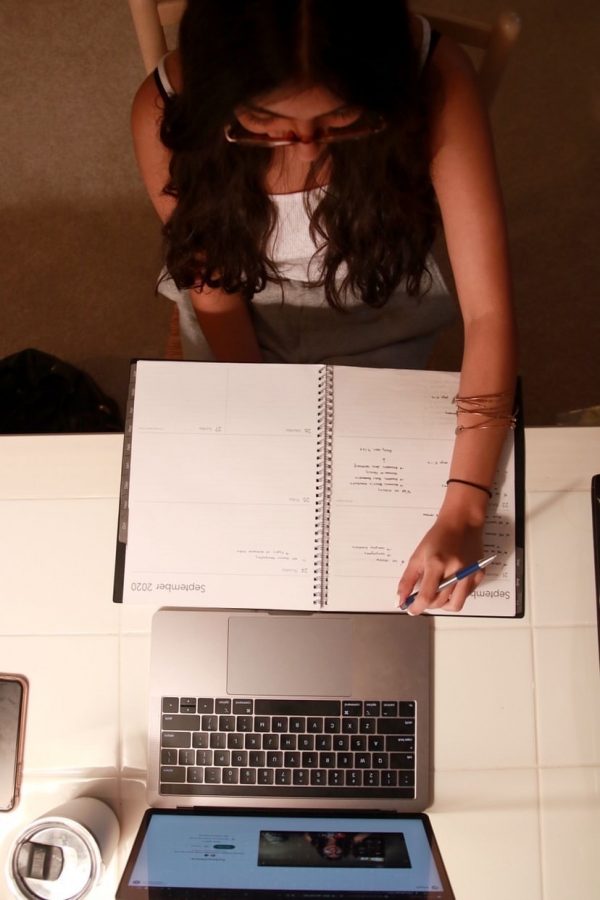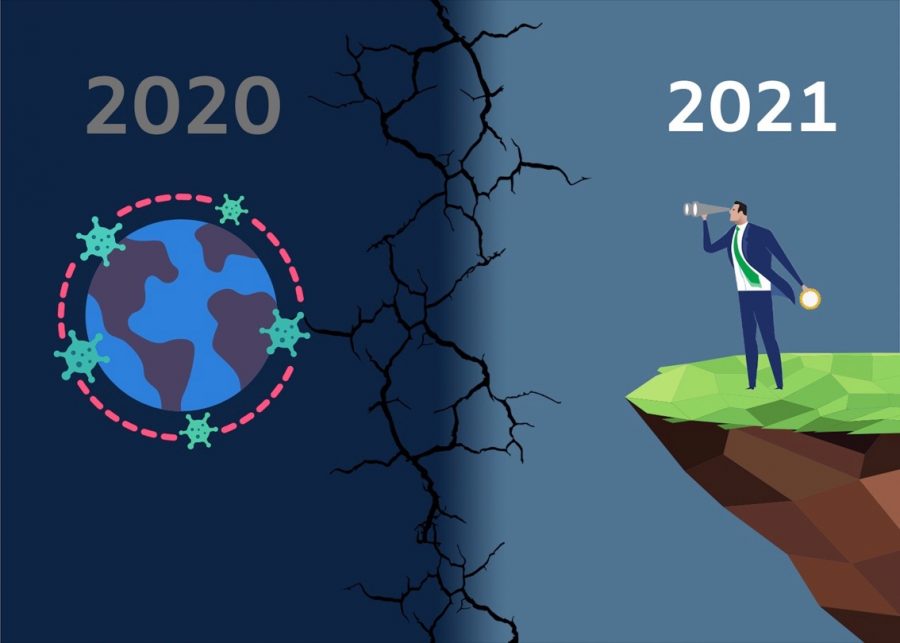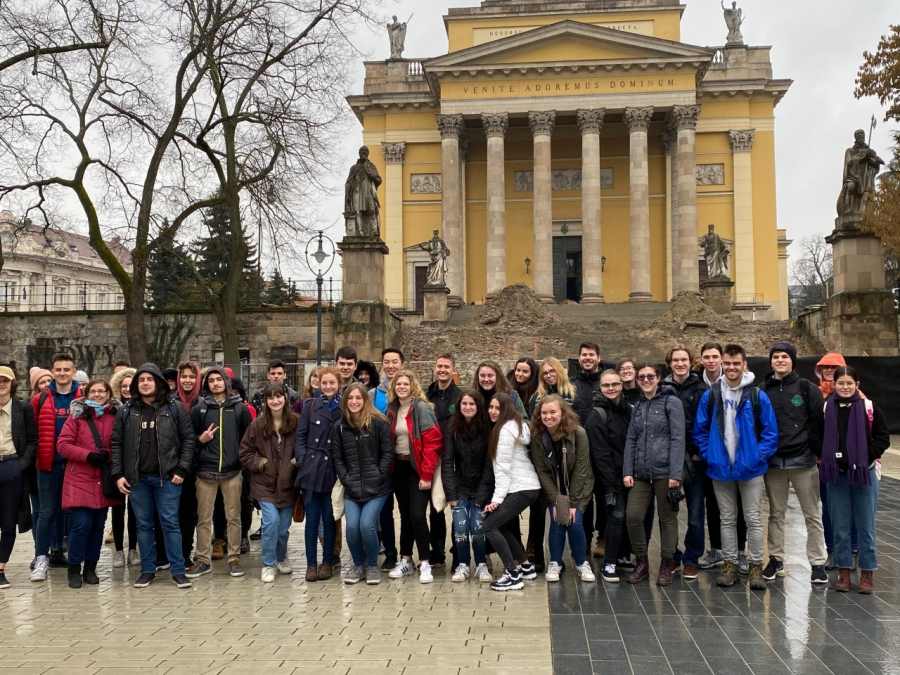The Week of March 13: One Year Apart
Students and teachers reflect on their experiences during the week of March 13, both before and after the pandemic changed the world
March 13, 2021
2020
One year ago, the Covid-19 virus changed the course of American lives. Loudoun County students were sent home the week of March 13, 2020, hoping to return in two weeks.
Sophomore Hagan Strite recalls that week of the school year.
“It was the start of the Spring season, teams were getting ready for their first game of the season. I was preparing for our first lacrosse game against Woodgrove,” Strite said. “The status of Covid wasn’t really a big thing at the time… it just seemed like something that wasn’t really going to affect us.”
For teachers, that week was nothing out of the ordinary.
“That week, I was teaching as normal in class,” French teacher Heidi Trude said. “That weekend prior, I would call it the last weekend on the town doing things. I spent that time painting pottery in a cute little pottery place in Fairfax, went to a cafe, and had dinner at a Saint Patrick’s Day restaurant before the assumed celebration rush came.”
Before the week of March 13, Trude traveled to New York City for the Northeast Conference on the Teaching of Foreign Languages representing the Foreign Language Association of Virginia, for which she served as president-elect. It would be the last time she traveled out of state before going into lockdown.
“A couple weeks prior to that was my last in person conference for teacher’s that I had… had that been a week or two later I don’t think that conference would’ve happened,” Trude said.
In the music department, important affairs were being planned for the later weeks of March. Kelly Holowecki, orchestra and choir department leader, was supposed to lead the occasions before they got called off.
“We were just about to go into several huge events that we do for music,” Holowecki said. “We were about a week and half away from assessment and the music was coming together. Also, we were supposed to go on a spring trip at the end of March to Hawaii.”
The orchestra department held a meeting to finalize last minute spring trip details with parents and students.
“At that point during the school day, we had heard rumors from the other schools and directors that there might be a two-week break leading up to spring break,” Holowecki said. “I went into the meeting really hopeful and positive, but by 5:30 the next day everything was canceled.”
Freshman Zoe Peters remembers Covid-19 as nothing more than a faint murmur and class jest.
“To be honest, I didn’t really know anything about Covid-19 at the time. Some kids made jokes about it in the hallway off of something they saw on tiktok or the news, but they didn’t know how serious it was,” Peters said. “I was really uneducated on the dangerous virus that was spreading across the globe and I didn’t realize my whole life along with everyone else’s was about to change.”
Travel both within and outside the United States around the time of March 13 had also been jeopardized. AP Human Geography teacher Kent Bailey had been overseas during the annual trip to Hungary with his students when Covid-19 became a threat to their safety.
“Up and until the day we left, I wasn’t sure if the trip was going to get canceled or not. We heard about things going on in China, and then of course it was Italy and right before we left cases started popping up in the United States. At that point, Hungary had zero cases so they just let us go,” Bailey said. “I emailed the parents and told them ‘I guess we are good,’ so we all went to Dulles and got on the airplane, but we had hand sanitizer and all that stuff, just predictive.”
After arriving at the student exchange in Debrecen, Hungary that Bailey taught at in previous years, Covid-19 slowly began to unravel the trip.
“That day, they asked that we not bring the students to the school because we were coming from the United States and there were cases in the United States. Saying teachers could come to the school, but asking students to stay with their host families,” Bailey said.
In Budapest, the students on the trip were supposed to participate in a Model UN conference. However, the conference was later canceled due to a Covid-19 case near the high school. Bailey and his colleague from Hungary quickly had to make new plans. Unexpectedly, a parent chaperon who had been on the trip also had connections with the U.S. State Department, and shared the rumor with Bailey that they are thinking of bringing people home.
“Mind you, all of this is going on and I am trying to lead tours through Budapest with a group of 15 to 17 kids,” Bailey said. “ During this whole time we are on the field trip, I am also calling the embassy just to get updates. It was very stressful.”
The parent chaperon was able to notify Bailey that the State Department was mandating that all non-essential personnel return to the U.S.
“Because of that one day notice, I was able to change our flight, contact all the parents, tell the kids that we were going home early,” Bailey says. “The next day, President Trump said closing the borders, and if you don’t come home here, you are going to have to be rerouted through select airports. And Dulles wasn’t one of those airports. So luckily I had this parent along who had these connections.”
At the airport in either Munich or Frankfurt, Bailey encountered a moment where all of his students might not have been able to return to the U.S.
“We were sitting in the airport and people from West Potenza were coming around and questioning people. Asking what they had been doing, if they had symptoms or anything like that,” Bailey said. “So I am thinking they are going to pull one of my students and they aren’t going to be able to go home.”
Everyone who attended the trip was safely allowed to board the plans without interference
“Fortunately, they let us go, but they were still pulling people out of line, writing stuff down. It felt as if I was fleeing a country,” Bailey says.
Throughout this entire experience, Bailey says he was receiving updates from Loudoun County regarding what the group should anticipate upon their return.
“I never would have imagined that would be the last time I see all of those students again.”
2021

Almost a year later, the events of the week of March 13, 2020 continue to influence the lives of students and teachers at Loudoun Valley.
Courtney Kincaid, the visual art teacher, notes that the month of March is important for members of the art department.
“March is Youth Art Month. Mr. Herbert and I would normally be preparing for the 2021 Night of the Arts show,” Kincaid said. “ It is such a wonderful event that celebrates Loudoun Valley’s artists.”
Despite not being able to host the show in-person, Kincaid is hopeful about arranging Valley’s first virtual art show.
Sophomore Maddy Helm notes that in a world without a pandemic, she would be a lot more likely to participate in more school and extracurricular activities.
“If I was in school, who knows where I would have been. I probably wouldn’t be doing the same things I am doing now… I would be much more involved in school spirit and outside activities,” Helm said.
During the past year, orchestra and choir department leader Kelly Holowecki finds that she has become more attuned to how the pandemic is affecting her students.
“I’ve grown in understanding what students are going through. I try to be more receptive to what goes on with them outside my specific class,” Holowecki said.
Beyond the classroom, teachers have also learned to identify their own needs. Trude expresses that she’s learned to give grace to herself as a teacher during this past year.
“I have to tell myself it’s okay to not be okay, it’s okay that you don’t know what’s going on,” Trude said.
Covid-19 took potential experiences and memories from many this year, especially the senior class. Sophomore Hagan Strite has compassion for all the seniors who had their senior year taken away from them.
“I’m empathetic towards seniors from this year and last year,” Strite says. “ They had their senior year ruined; your senior year is supposed to be the best year in your high school experience but theirs was ruined and they can’t get it back.”
Senior Maris Robey was eager for her senior year.
“I was looking forward to being the head of the school, like that same feeling in eighth grade. You feel like a leader since you are the oldest,” Robey says. “ Also, I was looking forward to leading the jungle.”
However, special education teacher Daniel Loper notes that the pandemic shouldn’t dampen the hope of the future.
“The week of March 13 doesn’t define us and the exasperation that so many people, including myself and my family, went through. Giving it importance compounds the anguish that everyone went through and continues to go through,” Loper said. “It’s going to be alright, we will be okay.”


